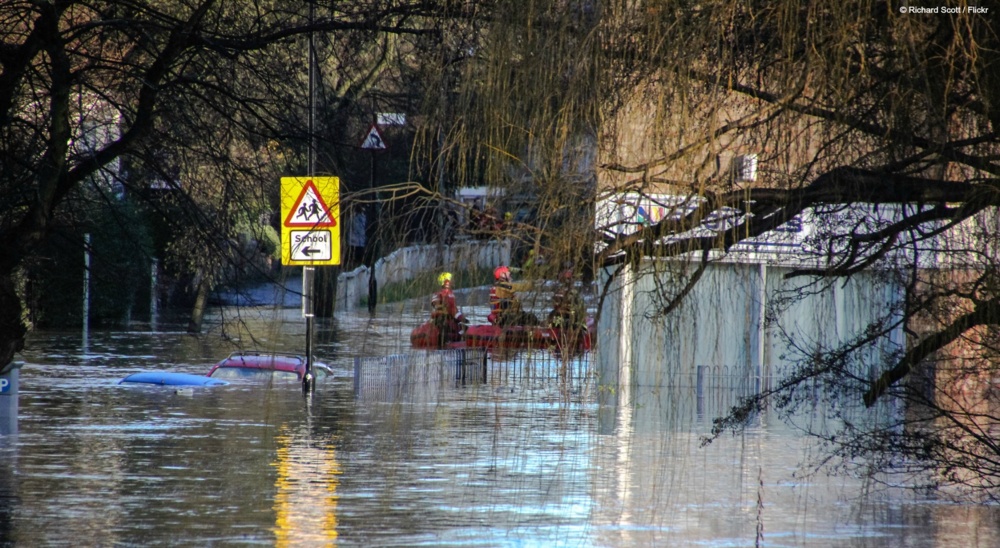
Climate Alert nr 1: No place like home
As I write this, the Eastern seaboard of the U.S. is just starting to emerge from an unprecedented snowstorm that crippled Washington DC and New York; the blizzard was the second-biggest snowstorm in New York City history with 68 cm of snow falling over the weekend. Before that, fires in Australia and drought in California caught the headlines. Closer to home, the pictures of Britain’s flooded streets, emergency operations and people fleeing their homes made the news for days. There is no place like home. Knowing that something as natural as wind and rain can invade our homes feels frightening. These natural weather conditions are seemingly becoming unnatural, record-breaking events – and what is to blame?
Man-made climate change is certainly one explanation of extreme weather. Scientists all over the world are studying the growing body of robust evidence when it comes to connecting the dots between extreme weather events and global warming.
In 2015, 32 scientific studies examined 28 extreme weather events recorded in 2014. Although this field of science is still considered as emerging, climate experts such as Dr. Kevin Trenberth, Head of Climate Analysis at the National Center for Atmospheric Research (NCAR), tend to agree that these particular events would not have happened in the same way without global warming.
Starting this series of Alerts on how climate change affects our lives, we will look at recent extreme weather events to underline the threats at both a national and international scale. Whether it takes the shape of floods, droughts, storms, heat waves or wildfires, the dramatic consequences on the economy, environment and human life call for immediate action. In the most extreme situations, such weather events can be a threat multiplier that undermines national security and poses potential threats to regional or even global peace, development and stability.
Economic. In December, Storms Desmond, Eva and Frank brought record levels of rainfall, flooding 3,500 homes in northwest England, while roads, rail and power links were cut leaving thousands of households without electricity or running water for days. When a house is flooded, the consequences are profound: physical dangers, damaged and lost possessions. Increased premiums for householders and businesses are just the start of it; according to PwC’s estimates, the damage caused by the storms could top £1.5bn, with small business and insurance firms hit hard. Consulting group IHS said the flooding caused by the storms could wipe out up to 0.2% off the UK's economic output in 2015.
Environmental. Extreme weather events cause multiple disturbances in the ecosystems. Storms and flooding can cause stress and destroy habitats. The effects of the recent storms on both the environment and wildlife have not been assessed yet, but the risks of fertilisers and other toxins - including from drowned livestock or wildlife leaking into the water courses - may be significant.
Human Life. Exhaustion, stress and feeling of insecurity are immediate direct consequences of such extreme weather events. The casualties of the storms in December include one man’s life. Many more lost their property and belongings. Human feelings and loss are difficult to measure, but should not be ignored.
These are the consequences of the extreme weather England faced in December, but what is the way forward? What are the solutions?
Possible solutions. There needs to be a more holistic investment into building resilience against extreme weather. Barriers and better land and water management are a first step. But more importantly, let’s connect the extreme weather events to climate change; this is the only way to reduce the growing threat. Building societies that can adapt and be resilient to climate change requires ending short-sightedness that too often revolves around electoral or financial cycles.
We need to act now. Investing in long-term solutions is good, but only if we, as a global society, are able to effectively reduce our emissions of greenhouse gases in the atmosphere. We can all play our part, reducing our individual carbon emissions and supporting a greener economy that has benefits for our planet, for us individually and collectively, for jobs and our economy and, well, ultimately for our survival.
At EJF we believe it is not too late to combat climate change; we believe that the solutions are within our grasp; we believe that what we need now is leadership and action. I hope you’ll join us to lead for change.
SIGN UP FOR OUR EMAILS AND STAY UP TO DATE WITH EJF